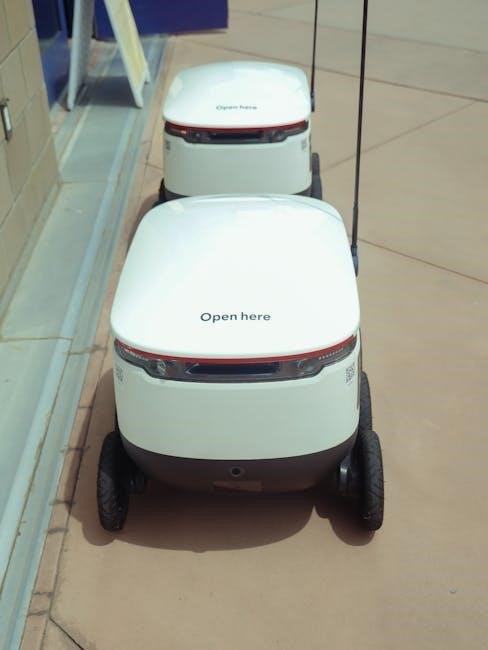AI PDF Drive revolutionizes document processing by leveraging artificial intelligence to extract insights, enabling smart searches and summaries while ensuring copyright compliance and data privacy.
What is AI PDF Drive?
AI PDF Drive is an advanced tool that leverages artificial intelligence to process, analyze, and extract insights from PDF documents. It integrates technologies like OCR and NLP to enable smart searching, summarization, and question-answering capabilities. Users can upload PDF files and interact with the content dynamically, receiving relevant information and references to specific sections. Designed for efficiency, AI PDF Drive supports academic research, business applications, and accessibility needs, while ensuring compliance with copyright laws and data privacy standards. Its user-friendly interface makes it accessible to professionals and students alike, enhancing productivity and streamlining document workflows across industries.
Importance of AI in PDF Processing
AI in PDF processing is crucial for enhancing efficiency and accessibility. It enables smart document analysis, making PDFs searchable and extractable, which is vital for academic research, business, and healthcare. AI tools ensure compliance with copyright laws and maintain data privacy, addressing concerns in sensitive industries. By automating tasks like summarization and question-answering, AI saves time and improves accuracy. Educators and students benefit from accessibility features, while businesses gain actionable insights. AI-driven PDF processing supports innovation, ensuring secure and ethical handling of digital content, making it indispensable in today’s data-driven world.
Applications of AI PDF Drive
AI PDF Drive offers versatile applications across industries. It aids academic research by summarizing lengthy documents, enabling quick access to key insights. In healthcare, it enhances accessibility by converting complex PDFs into readable formats for individuals with disabilities. Businesses utilize it for efficient document analysis, improving decision-making processes. Additionally, AI PDF Drive supports education by helping students and educators manage and interpret large volumes of information. Its ability to ensure copyright compliance and data privacy makes it a reliable tool for sensitive applications, fostering innovation and practical solutions across various sectors.
Evolution of AI in PDF Processing
AI in PDF processing has advanced significantly, from basic OCR to intelligent document analysis. Recent innovations in deep learning and NLP enable enhanced text recognition and smarter processing.
History of AI Integration with PDFs
The integration of AI with PDFs began with early OCR technologies in the 1990s, enabling basic text extraction. Over time, advancements in machine learning and NLP expanded capabilities, improving text recognition accuracy and enabling semantic understanding. The 2010s saw the rise of AI-driven PDF tools that could analyze complex layouts and extract structured data. Recent innovations now allow AI to summarize, translate, and even generate content from PDFs, making them more accessible and useful across industries like academia, business, and healthcare.
Key Milestones in AI PDF Technology
The development of AI PDF technology has seen significant milestones, starting with the introduction of basic OCR in the 1990s. The 2010s marked the rise of machine learning algorithms capable of understanding complex PDF layouts. Recent advancements include the integration of NLP for semantic comprehension and the ability to process multilingual documents. AI-driven tools now offer real-time summarization, content generation, and advanced data extraction, revolutionizing industries like academia, healthcare, and business; These milestones highlight the rapid evolution of AI in PDF processing, enabling smarter and more efficient document handling.

Core Technologies Behind AI PDF Drive
AI PDF Drive is powered by OCR, NLP, and machine learning, enabling intelligent document processing, text extraction, and semantic understanding, while ensuring accuracy and efficiency in handling complex PDFs.
Optical Character Recognition (OCR)
OCR is a foundational technology in AI PDF Drive, enabling the conversion of scanned or image-based text into editable and searchable digital formats. By analyzing pixel patterns, OCR identifies and extracts text, facilitating tasks like search, editing, and analysis. This technology is crucial for processing complex PDFs, especially those with handwritten or printed content. Advanced OCR systems integrate with NLP and machine learning to improve accuracy, even in multi-language documents. Its applications span academic research, business, and healthcare, making it indispensable for automating workflows and enhancing accessibility while ensuring compliance with copyright and privacy standards.
Natural Language Processing (NLP)
NLP is a core technology in AI PDF Drive, enabling machines to understand and interpret human language within documents. It powers advanced features like text summarization, sentiment analysis, and question answering, making PDF content more accessible and actionable. By analyzing context and semantics, NLP enhances search functionality and facilitates intelligent document navigation. Its applications in academic research and business streamline workflows, while its integration with OCR ensures accurate extraction of meaningful insights. NLP also supports multilingual processing, bridging language barriers and enabling global accessibility, making it a vital component for enhancing productivity and decision-making across industries.
Machine Learning Algorithms
Machine learning algorithms are integral to AI PDF Drive, enabling intelligent document processing through pattern recognition and adaptive learning. These algorithms enhance accuracy in OCR and NLP tasks, improving text recognition and comprehension. They power features like smart search and document categorization, allowing users to efficiently locate and organize information. By analyzing data and learning from interactions, these algorithms optimize performance over time, providing personalized experiences. They also contribute to ethical considerations by minimizing the detection of AI-generated content and ensuring data privacy. This capability makes AI PDF Drive a robust tool for enhancing productivity, accessibility, and ethical document handling across various industries.
Use Cases of AI PDF Drive
AI PDF Drive enhances academic research, streamlines business workflows, and improves healthcare accessibility by enabling intelligent document processing, summarization, and extraction, ensuring efficient and ethical content handling.
Academic Research and Summarization
AI PDF Drive empowers researchers by analyzing lengthy documents, extracting key insights, and summarizing complex content. It enables efficient literature reviews and precise citation references, ensuring accuracy. Students and scholars can quickly grasp main ideas without reading entire texts, saving time. The tool also supports ethical use by maintaining copyright compliance and data privacy. Educators can avoid plagiarism concerns by leveraging AI for learning purposes. This innovative solution enhances academic productivity while upholding intellectual integrity, making it indispensable for modern research and education.
Business Applications
AI PDF Drive transforms business operations by automating document analysis, enabling efficient extraction of actionable insights. It streamlines tasks like data extraction, contract review, and report generation, enhancing productivity. Businesses can quickly identify trends and make informed decisions with AI-driven summaries. The tool also ensures compliance with copyright and data privacy regulations, crucial for corporate operations. By integrating AI PDF Drive, companies reduce manual effort and costs, achieving scalability in handling large volumes of documentation. This solution is pivotal for modern enterprises seeking to optimize workflows and maintain competitive advantage in a data-driven world.
Healthcare and Accessibility
AI PDF Drive enhances accessibility by converting complex PDF documents into readable formats for visually impaired individuals, ensuring equal access to information. In healthcare, it aids in analyzing medical records, research papers, and clinical trial data, facilitating faster decision-making. The tool also supports accessibility tools like screen readers, enabling seamless navigation for users with disabilities. By integrating AI-driven summarization, it helps healthcare professionals quickly extract key insights from lengthy documents, improving patient care and research efficiency. This technology bridges gaps in accessibility while ensuring data security and compliance, making it indispensable in the healthcare sector.

Ethical Considerations
AI PDF Drive raises concerns about copyright infringement, data privacy, and the detection of AI-generated content, emphasizing the need for ethical guidelines to ensure responsible usage and compliance.
Copyright Compliance
AI PDF Drive must navigate copyright laws to avoid infringement. Users should ensure they have authorization to process copyrighted materials, respecting intellectual property rights. Proper attribution and licensing are crucial.
Risks of infringement arise when AI-generated content mimics copyrighted work. Clear guidelines and filters can help mitigate these issues, promoting ethical and legal document processing practices.
Data Privacy and Security
AI PDF Drive prioritizes data privacy and security, ensuring sensitive information remains protected. Encryption and secure access controls safeguard PDF content during processing. Compliance with regulations like GDPR and CCPA is essential to maintain trust and legality. Users must be aware of data handling practices, ensuring personal or confidential information is not misused. Regular audits and updates help mitigate potential vulnerabilities, providing a robust framework for secure document management.

Detecting AI-Generated Content
Detecting AI-generated content in PDFs is crucial for maintaining originality and preventing plagiarism. AI PDF Drive incorporates advanced algorithms to identify text generated by AI tools, ensuring authenticity. This feature is particularly valuable in academic and professional settings, where accurate attribution is essential. By analyzing linguistic patterns and stylistic inconsistencies, AI PDF Drive helps users verify the legitimacy of content, fostering trust and accountability in document creation and sharing.

Future Trends
AI PDF Drive will advance with enhanced OCR, NLP, and machine learning, enabling smarter document processing, improved accessibility, and seamless integration with emerging technologies like quantum computing.
Advancements in AI PDF Technology
Future advancements in AI PDF technology will focus on improving OCR accuracy, enhancing NLP for better context understanding, and integrating with emerging technologies like quantum computing. These innovations will enable faster and more precise document processing, allowing users to extract insights efficiently. Additionally, advancements in accessibility features will make PDF content more usable for visually impaired individuals. AI-driven tools will also incorporate ethical AI detection mechanisms to combat plagiarism and ensure copyright compliance. As AI PDF technology evolves, it will become more seamless, intuitive, and capable of handling complex document analyses, revolutionizing industries worldwide.
Integration with Emerging Technologies
AI PDF Drive is poised to integrate with emerging technologies like IoT, edge computing, and advanced NLP, enabling real-time document processing across interconnected devices. This fusion will enhance scalability, reduce latency, and offer seamless integration with cloud platforms. Additionally, the incorporation of energy-efficient AI models will promote sustainability, aligning with global green technology initiatives. These advancements will empower users to process documents more efficiently, leveraging cutting-edge innovations while maintaining data privacy and security. The integration of AI PDF Drive with these technologies promises to redefine document management, making it smarter, faster, and eco-friendly for future applications.
